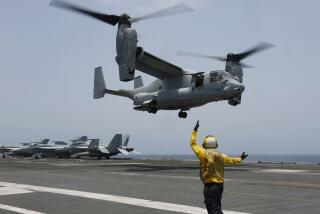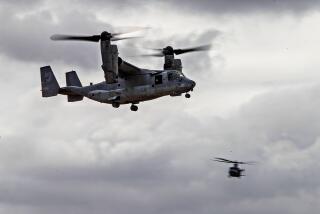Pilot Files $26-Million Suit Against 8 Companies : Courts: The defective-part litigation also includes Pacific Scientific of Yorba Linda.
SANTA ANA — The pilot of a firefighting helicopter that crashed in 1992 in the Idaho mountains filed suit Tuesday in Orange County Superior Court, charging that a defective engine part, originally manufactured for the military, found its way into his civilian aircraft.
Joseph Koller Jr., 42, of Vista is seeking $26 million in damages from eight U.S. and Canadian companies, including one in Yorba Linda and another in Burbank, for injuries he sustained in the crash. His suit contends that the companies fraudulently certified that turbine blades manufactured for the military were approved by the Federal Aviation Administration for civilian aircraft.
Koller’s attorneys say defense spending cutbacks have resulted in airline parts designed for military use--but not approved by the FAA--finding their way into the civilian aviation fleet.
The eight companies, according to the suit, “represented that said parts were approved by the Federal Aviation Administration, when in fact said parts were not approved by the FAA. . . . The true fact was that these parts had been rejected by the FAA because they did not meet the standards for commercial aviation use.”
Several of the companies, the suit says, “fraudulently created a false document which deliberately misrepresented that (the parts) were approved by the FAA . . . so the blades would be purchased at a higher price and placed into commercial aircraft.”
The companies sued were Textron Lycoming, of Stratford, Conn., which designed the engine; Standard Aero Limited Inc. of Manitoba, Canada, which operates a Lycoming engine service center; Concorde Casting Inc., of Eastlake, Ohio, which manufactured the turbine blades; SIFCO Inc., of Minnesota, which machined the blades; Heli-Jet Corp. of Eugene, Ore., which engaged Koller to fly firefighting missions for the U.S. Forest Service; J.T. Supplies, of Burbank, a parts wholesaler; Pacific Scientific Co. of Yorba Linda, which manufactured the helicopter’s seat belts; and Universal Aircraft Parts, of Hialeah, Fla.
Textron officials could not be reached for comment Tuesday. Company officials in Yorba Linda and Newport Beach declined comment.
Koller’s Bell 205A1 helicopter crashed Aug. 3, 1992, while he was fighting a fire west of Arco, Idaho, making “water bucket drops” over the Antelope Valley.
About 100 yards short of his landing zone, Koller contends that he heard “a loud explosion, followed by a grinding of metal.” His craft, which was carrying seven college students working as summer firefighters, dropped 150 to 200 feet to the ground, bounced 50 feet and rolled over, according to court documents.
None of the college students were seriously injured. But in his suit, Koller said he suffered fractured vertebrae and other “serious and permanent injuries.”
During the Vietnam war, Koller piloted the military version of the Bell 205A1, the Huey.
The suit charges that the power turbine disc installed in Koller’s aircraft was defective and not approved by the FAA for civilian use. It further charges that “Lycoming knew that the (part) manufactured by Concorde Casting was defective.”
Pacific Scientific was included in the case, according to the suit, because the safety shoulder restraint system “malfunctioned and/or disengaged” at the time of the crash, causing Koller to be “thrown violently around the cockpit.”
More to Read
Inside the business of entertainment
The Wide Shot brings you news, analysis and insights on everything from streaming wars to production — and what it all means for the future.
You may occasionally receive promotional content from the Los Angeles Times.










